Boris Johnson and Islamophobia
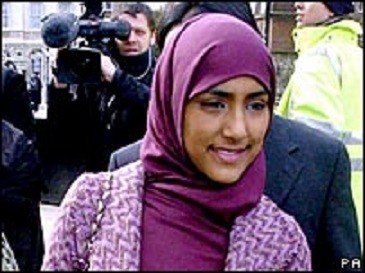 Boris Johnson’s recent Telegraph article, in which he mocked niqab-wearing women by describing them as looking like letter boxes or bank robbers, has been widely condemned. But this isn’t the first time Johnson has weighed in on the subject of Muslim women’s clothing. Back in 2006 he devoted his Telegraph column to celebrating the defeat of the court case launched by Shabina Begum (pictured) over her right to wear the jilbab at her school in Luton. Johnson characterised Shabina’s campaign to wear clothing in accordance with her religious beliefs as a demand to “break school rules, and wear a tent”.
Boris Johnson’s recent Telegraph article, in which he mocked niqab-wearing women by describing them as looking like letter boxes or bank robbers, has been widely condemned. But this isn’t the first time Johnson has weighed in on the subject of Muslim women’s clothing. Back in 2006 he devoted his Telegraph column to celebrating the defeat of the court case launched by Shabina Begum (pictured) over her right to wear the jilbab at her school in Luton. Johnson characterised Shabina’s campaign to wear clothing in accordance with her religious beliefs as a demand to “break school rules, and wear a tent”.
So demeaning Muslim women by sneering at their religious dress is nothing new as far as Johnson is concerned.
Indeed, in 2006 he went further, suggesting that Shabina’s legal challenge was part of some sinister Islamic plot to conquer the West. “This case wasn’t even about religion, or conscience, or the dictates of faith,” he wrote. “At least it wasn’t primarily about those things. It was about power. It was about who really runs the schools in this country, and about how far militant Islam could go in bullying the poor, cowed, gelatinous and mentally spongiform apparatus of the British state.”
For Johnson, the court case was yet another of “the disasters of multiculturalism, the system by which too many Muslims have been allowed to grow up in this country with no sense of loyalty to its institutions, and with a sense of complete apartness”.
But this was par for the course with Johnson, who by that point had established an unenviable record of journalistic Islamophobia. In the aftermath of the London transport bombings of 7 July 2005, for example, he similarly blamed the attacks on multiculturalist concessions to Muslims and depicted the terrorists’ acts as directly inspired by Islam.
In his Telegraph column of 14 July, Johnson asserted that the bombers were the product of a multicultural society in which “too many Britons have absolutely no sense of allegiance to this country or its institutions. It is a cultural calamity that will take decades to reverse”. He declared: “We need to acculturate the second-generation Muslim communities to our way of life.” And he continued: “That means the imams will have to change their tune, and it is no use the Muslim Council of Great Britain [sic] endlessly saying that ‘the problem is not Islam’, when it is blindingly obvious that in far too many mosques you can find sermons of hate, and literature glorifying 9/11 and vilifying Jews.”
In the 16 July edition of the Spectator Johnson pursued the theme of the religious roots of terrorism: “The Islamicists last week horribly and irrefutably asserted the supreme importance of that faith, overriding all worldly considerations, and it will take a huge effort of courage and skill to win round the many thousands of British Muslims who are in a similar state of alienation, and to make them see that their faith must be compatible with British values and with loyalty to Britain. That means disposing of the first taboo, and accepting that the problem is Islam. Islam is the problem.”
He continued: “To any non-Muslim reader of the Koran, Islamophobia — fear of Islam — seems a natural reaction, and, indeed, exactly what that text is intended to provoke. Judged purely on its scripture — to say nothing of what is preached in the mosques — it is the most viciously sectarian of all religions in its heartlessness towards unbelievers…. we look in vain for the enlightened Islamic teachers and preachers who will begin the process of reform. What is going on in these mosques and madrasas? When is someone going to get 18th century on Islam’s mediaeval ass?”
Johnson declared: “It is time that we started to insist that the Muslim Council of Great Britain, and all the preachers in all the mosques, extremist or moderate, began to acculturate themselves more closely to what we think of as British values…. by way of a first gesture the entire Muslim clergy might announce, loud and clear, for the benefit of all Bradford-born chipshop boys, that there is no eternal blessedness for the suicide bombers, there are no 72 virgins, and that the whole thing is a con and a fraud upon impressionable minds. That might be a first step towards what could be called the re-Britannification of Britain.”
Shockingly, Johnson saw fit to to publish these inflammatory articles in the midst of a racist backlash against the Muslim community (see here and here for contemporary reports by the Institute of Race Relations) during which one victim, Kamal Raza Butt, had been beaten to death.
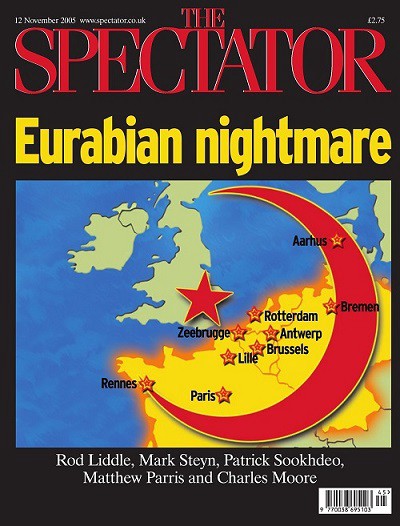 Johnson’s promotion of rabid Islamophobia at the Spectator wasn’t restricted to his own columns but extended to his role as the magazine’s editor. In November 2005, in response to the wave of riots in the French banlieues, mainly involving youth of North African heritage, he produced an entire issue that was devoted to the threat of Islam.
Johnson’s promotion of rabid Islamophobia at the Spectator wasn’t restricted to his own columns but extended to his role as the magazine’s editor. In November 2005, in response to the wave of riots in the French banlieues, mainly involving youth of North African heritage, he produced an entire issue that was devoted to the threat of Islam.
The provocative title, “Eurabian nightmare”, referenced a notorious conspiracy theory according to which the European elites have done a deal with the Arab world to allow unrestricted Muslim immigration to the continent and facilitate the submission of the indigenous population to Islam. This paranoid fantasy was popularised by Bat Ye’or in her 2005 book Eurabia: The Euro-Arab Axis, which provides the same inspiration for Islamophobes that The Protocols of the Elders of Zion does for antisemites.
Johnson commissioned a number of hardline Islamophobic authors — Rod Liddle, Patrick Sookhdeo and Mark Steyn — to submit material for that issue of the Spectator. They were only too happy to oblige, even managing to outdo their editor in the anti-Islamic vitriol they produced.
In an article titled “The crescent of fear” Rod Liddle offered the following interpretation of the French riots: “there have been whole legions of pundits wheeled out to offer an explanation. It’s deprivation, a lack of integration, poverty, unemployment, incipient French racism and so on. But the dreaded ‘M’ word has scarcely been mentioned at all; these were ‘young’ rioters or sometimes ‘immigrant’ rioters — they were never Muslim rioters. Islam was almost never mentioned…. It may well be that the motive for the rioting was nothing more than an inchoate grievance allied to youthful exuberance and a penchant for bad behaviour, but it was Islam which gave it an identity and also its retrospective raison d’être.”
Patrick Sookhdeo — a right-wing evangelical Christian who had already been given a platform by Johnson in the aftermath of the 7/7 attacks to denounce “The myth of moderate Islam” — was brought in to pose the question “Will London burn too?” Sookhdeo thought it probably would. “A book published in 1980 by the Islamic Council of Europe,” he wrote, “gives instructions for how Muslim minorities are to work towards achieving domination of European countries through a policy of concentration in geographical areas.”
He continued: “The Muslim community in France is well on the way to becoming … a state within a state. The only substantive goal still outstanding is the implementation of Islamic law (Shariah) instead of French law. Muslims in France have by and large rejected the concept of the integration of individuals and are working instead for the integration of communities. The same is happening in the UK, where the concept of multiculturalism has long been popular.”
Sookhdeo explained: “Islam is a territorial religion. Any space once gained is considered sacred and should belong to the umma for ever. Any lost space must be regained — even by force if necessary. Migrant Muslim communities in the West are constantly engaged in sacralising new areas — first the inner private spaces of their homes and mosques, and latterly whole neighbourhoods (e.g., Birmingham) by means of marches and processions. So the ultimate end of sacred space theology is autonomy for Muslims of the UK under Islamic law.”
One Muslim critic rightly described this as “the sort of paranoid conspiracy nonsense which would have its author out of the door of any publication of left or right if Jews were its target”.
Mark Steyn for his part (“It’s the demography, stupid”) predicted that Muslim population growth was preparing the ground for a “Eurabian civil war”. He warned: “One day they’ll even be on the beach at St Trop, and if you and your infidel whore happen to be lying there wearing nothing but two coats of Ambre Solaire when they show up, you better hope that the BBC and CNN are right about there being no religio-ethno-cultural component to their ‘grievances’.”
Steyn was, however, prepared to concede that not all Muslims are the same: “… it’s true there are Muslims and there are Muslims: some blow up Tube trains and some rampage through French streets and some claim Mossad’s put something in the chewing gum to make Arab men susceptible to the seduction techniques of Jewesses. Some kill Dutch film-makers and some complain about Piglet coffee mugs on co-workers’ desks, and millions of Muslims don’t do any of the above but apparently don’t feel strongly enough about them to say a word in protest.”
He continued: “And it’s also true that it’s better to have your Peugeot torched than to be blown apart on the Piccadilly Line. But what all these techniques — and those of lobby groups who offer themselves as interlocutors between bewildered European elites and ‘moderate’ Muslims — have in common is that they advance the Islamification of Europe.”
All of this expressed the same sort of irrational anti-Muslim hatred that inspired Anders Breivik. Yet it here it was, thanks to Johnson’s editorship, in the pages of a mainstream conservative magazine.
Having given further vent to his prejudices against Muslims and multiculturalism in his 2006 Telegraph column on Shabina Begum, Johnson returned to the theme later that year, offering the following advice to the then Labour home secretary John Reid:
“Here is the bravest thing he could possibly say. He should say that the real problem in our society, and the reason we have so many disaffected and alienated Muslim youths, is that for a generation he and people like him supported the disastrous multicultural agenda. The reason that 40 per cent of British Muslims would like some form of Sharia law in this country is that the Left has traditionally deprecated British institutions and even the teaching of English. A truly brave John Reid would now publicly grovel to Ray Honeyford, the Bradford head who called for teaching in English and who was vilified and persecuted by the Left.”
Johnson was referring to the controversy over Honeyford’s notorious Salisbury Review article from 1984 in which he claimed to expose “the real educational consequences of the general acceptance of the notion that multi-racial inner cities are not only inevitable but, in some sense, desirable”.
Honeyford opined: “‘Cultural enrichment’ is the approved term for the West Indian’s right to create an ear splitting cacophony for most of the night to the detriment of his neighbour’s sanity, or for the Notting Hill Festival [sic] whose success or failure is judged by the level of street crime which accompanies it.” Reporting on a meeting at his school with parents of South Asian heritage, Honeyford wrote: “The hysterical political temperament of the Indian sub-continent became evident — an extraordinary sight in an English School Hall.” He denounced as “totalitarian” the proposals by Black activists that “schoolbooks with a racist content should be scrapped” and that “racist teachers should be dismissed”. This was the man Johnson hailed as a hero.
 Unfortunately for Johnson, his promotion of right-wing racist bigotry came back to bite him after his selection as Tory candidate for the 2008 London mayoral election. During the election campaign his Labour rival Ken Livingstone raised Johnson’s response to the 7/7 bombings, to the latter’s considerable embarrassment. During an LBC radio hustings in April 2008 Johnson asserted that, if he had been mayor at the time of the attacks, he would have said “exactly the same” as Ken did in his powerful speech defending London as a multicultural city where different communities lived together in peace and would refuse to be divided by the murderous acts of terrorists.
Unfortunately for Johnson, his promotion of right-wing racist bigotry came back to bite him after his selection as Tory candidate for the 2008 London mayoral election. During the election campaign his Labour rival Ken Livingstone raised Johnson’s response to the 7/7 bombings, to the latter’s considerable embarrassment. During an LBC radio hustings in April 2008 Johnson asserted that, if he had been mayor at the time of the attacks, he would have said “exactly the same” as Ken did in his powerful speech defending London as a multicultural city where different communities lived together in peace and would refuse to be divided by the murderous acts of terrorists.
Ken retorted: “I know what Boris would have said because he wrote it in the Spectator the following week. Very different. I said this is a criminal act by a handful of men. It doesn’t define a faith or an ideology. What you said, Boris, was Islam was the problem…. And the Koran is inherently violent. I actually made certain that we were looking at individuals. You smeared an entire faith.”
Typically, Johnson responded by blustering and lying, angrily accusing Ken of misrepresenting him: “Can I tell you what deep offence I take at that? I think you really traduce what I said. My view is that Islam is a religion of peace and indeed I am very proud to say I have Muslim ancestors. My great-grandfather knew the Koran off by heart, Ken Livingstone, and I really wish you would leave off these kinds of tactics, which demean this race and demean your office.”
Still, Ken’s criticism would have hit home. As would the Evening Standard’s subsequent report that the campaign group Muslims 4 Ken were mobilising their co-religionists to vote against Johnson. The paper warned: “Nearly half a million Muslim voters are being urged to support Ken Livingstone against Boris Johnson in the closing stages of the mayoral election. A year-long strategy to mobilise the Muslim vote for Ken moves into overdrive this week, accompanied by a campaign of vilification aimed at Boris.” The Standard claimed: “A sinister element of the campaign is the effort to portray Boris as a Muslim hater. Websites have been bombarded with selected quotes from his journalism. One, Islamophobia Watch, carries a long list of excerpts from his articles under the heading Back Boris Urges BNP.” It was notable that the Standard made no attempt to deny the accuracy of these quotes.
In the outcome, despite the mobilisation of Muslim voters against him, Johnson did win the 2008 London mayoral election. All the same, he must have realised that belligerent hostility towards Islam and multiculturalism was not a good look in a diverse city with a large Muslim population. As a Tory journalist, Boris had been happy to throw red meat to the right-wing readers of the Spectator and Telegraph by endorsing their prejudices against Muslims. But he was astute enough to recognise that the people of London would never tolerate that sort of behaviour on the part of their mayor.
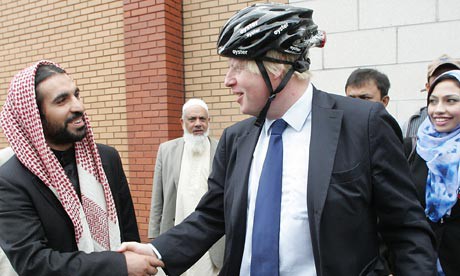 So in order to consolidate his hold on power Johnson changed tack and for a while presented a much more liberal face to Londoners. He suddenly discovered the merits of the city’s multicultural diversity and made a determined effort to mend fences with the Muslim community. In September 2009 he paid an official mayoral visit to the East London Mosque, where he delivered the following speech:
So in order to consolidate his hold on power Johnson changed tack and for a while presented a much more liberal face to Londoners. He suddenly discovered the merits of the city’s multicultural diversity and made a determined effort to mend fences with the Muslim community. In September 2009 he paid an official mayoral visit to the East London Mosque, where he delivered the following speech:
“Whether it’s in theatre, comedy, sports, music or politics, Muslims are challenging the traditional stereotypes and showing that they are, and want to be, a part of the mainstream community. That’s why I urge people, particularly during Ramadan, to find out more about Islam, increase your understanding and learning, even fast for a day with your Muslim neighbour and break your fast at the local mosque. I would be very surprised if you didn’t find that you share more in common than you thought.
“Muslims are at the heart of every aspect of society. Their contribution is something that all Londoners benefit from. Muslim police officers, doctors, scientists and teachers are an essential part of the fabric of London. Islamic finance is contributing to the economy by changing the way Londoners invest, save, borrow and spend. There are valuable lessons that people of all backgrounds can learn from Islam such as the importance of community spirit, family ties, compassion and helping those less fortunate, all of which lie at the heart of the teachings of Ramadan.”
Some of Johnson’s supporters were not best pleased at this astonishing volte-face. He found himself under attack from Tim Montgomerie of ConservativeHome who repeated smears from Harry’s Place against the East London Mosque and accused Johnson of consorting with terrorist sympathisers. The following month a now defunct right-wing think tank, the laughably misnamed Centre for Social Cohesion (director Douglas Murray), launched an attack on Johnson over his co-sponsorship of Eid in the Square with the Islam Channel, whose CEO, Tunisian oppositionist Mohamed Ali Harrath, spoke at the event. The CSC sought to misrepresent Harrath as a violent extremist.
Basing himself on material supplied by the CSC, Ted Jeory produced a characteristically Islamophobic piece for the Sunday Express (“Boris’s terror link”), while the CSC’s Alexander Meleagrou-Hitchens followed this up with an article for ConservativeHome (“Boris fails to tackle Islamic extremism”). Meleagrou-Hitchens complained that the mayor’s actions were “a huge disappointment to those who voted for Boris Johnson in the hope that it would signal a shift away from Ken Livingstone’s policy of engaging with radicals”.
But what did Johnson care? He was facing re-election in 2012 and was quite prepared to perform an ideological U-turn on Islam in order to defuse a potential revolt by Muslim voters. Needless to say, he saw no need to apologise for his earlier statements or explain this opportunist change of line. Like Groucho Marx, Johnson has his principles and if you don’t like them, he has others.
Following his second mayoral election victory Johnson changed tack yet again. He wasn’t planning to stand for a third term, so there was no longer any need to ingratiate himself with London’s large Muslim electorate. Having raised his own political profile during his time as mayor (even if he achieved little else), Johnson’s sights were now set on a return to national politics and a possible leadership bid. The pressure to present a friendly face to the Muslim community, who comprise less than 5% of the population nationally, was considerably reduced. So the liberal mask was thrown off and he reverted to type.
Still, Johnson could understand that simply resurrecting his old “Islam is the problem” rhetoric would be counterproductive. In his response to the murder of Lee Rigby in 2013 the crude Islamophobic rhetoric of July 2005 was replaced with a rather more sophisticated approach. Johnson told readers of his Telegraph column that “we must be clear in our heads that there is no sense in blaming Islam, a religion that gives consolation and enrichment to the lives of hundreds of millions of peaceful people”. Instead he identified the problem as “Islamism”. According to Johnson:
“This is a sinister political agenda that promotes a sense of grievance and victimhood among a minority of Muslims. The Islamists want universal sharia law, and other mumbo jumbo. Above all, they want power over others: and so they prey on young men who feel in some way rejected by society, and they fill those young men with a horrible and deluded sense of self-importance. They tell these people that they are not alone in suffering injustice; that they belong to a much wider group of victims — the Muslims — and that the only way to avenge these injustices is jihad. These Islamist evangelists have no allegiance to the Western society they live in and whose benefits systems they abuse: far from it — their avowed intent is to create a sexist and homophobic Muslim caliphate.”
The idea that there are many different strands of Islamism, most of which reject terrorist violence, was of course completely lost on Johnson. For him, political Islam in all its shades was the enemy. Not only that, but he went on to suggest that even non-political conservative interpretations of Islam are connected to violent extremism. Taking up a recent moral panic over gender-segregated meetings on campus, he wrote: “The universities need to be much, much tougher in their monitoring of Islamic societies. It is utterly wrong to have segregated meetings in a state-funded centre of learning.”
Johnson’s new hard line went down well with the right-wing press. The Daily Mail (“Boris Johnson has attacked Islamists who want to impose ‘mumbo-jumbo’ sharia law on Britain”) was full of enthusiasm, as was the Telegraph (“Universities should stop pandering to Islamic extremists by allowing segregated lectures, Boris Johnson says today”). Johnson must have been delighted. This was just the sort of publicity he needed to boost his support among the Tory rank and file and position himself for a future leadership challenge.
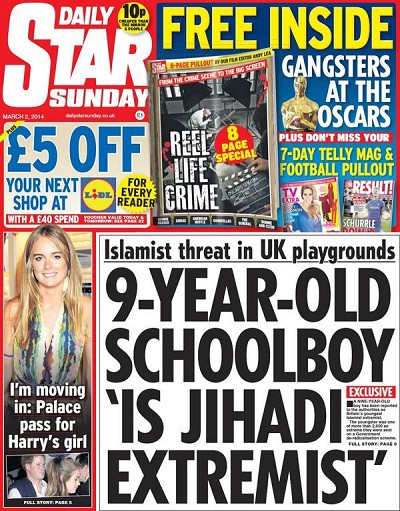 In March 2014, following the sentencing of Lee Rigby’s killers, Johnson returned to the subject of the Islamist threat. He insisted that “we must be firm to the point of ruthlessness in opposing behaviour that undermines our values”, including “Islamic radicalisation”.
In March 2014, following the sentencing of Lee Rigby’s killers, Johnson returned to the subject of the Islamist threat. He insisted that “we must be firm to the point of ruthlessness in opposing behaviour that undermines our values”, including “Islamic radicalisation”.
Probably taking his inspiration from tabloid hysteria about schoolboy jihadis, Johnson warned that “some young people are now being radicalised at home”. There could, he wrote, be “hundreds of children” whose parents were teaching them “crazy stuff: the kind of mad yearning for murder and death that we heard from Lee Rigby’s killers”. Johnson had a solution: the authorities should dispense with “political correctness” and children considered to be under threat of “radicalisation” by their Muslim parents should be taken into care.
Quite what this had to do with the murder of Lee Rigby was unclear, given that both his killers were Muslim converts who had been brought up in Christian families. But Johnson’s proposal met with the approval of the Daily Mail (“Children of Islamist radicals should be in care, suggests Boris: Mayor of London warns hundreds at risk of being turned into fanatics by extreme parents”) and also the English Defence League. While some EDL supporters took the view that the problem would be more effectively solved by expelling the entire Muslim community from the UK, or killing them, there was considerable agreement with Johnson’s plan (“BORIS FOR PRIME MINISTER!”, “He talks sense”, “Long live Boris!”, “Good on you Boris, we need more of you”).
Having re-established his right-wing credentials at the expense of the Muslim community, Johnson then secured his selection as parliamentary candidate for the safe Tory seat of Uxbridge and South Ruislip. So he would have been well placed to contest the Tory leadership in the event of a poor showing by the party in the 2015 general election. Unfortunately for Johnson, against most predictions the Tories managed to secure an overall parliamentary majority in that election. David Cameron’s position was apparently secure and Johnson’s leadership plans had to be put on hold. Then, when Cameron did resign in 2016 after losing the EU referendum, Johnson’s leadership campaign was torpedoed by his friend and ally Michael Gove.
Now, following his own resignation as foreign secretary in protest at the government’s proposals for a softer Brexit than Tory hardliners favour, Johnson’s leadership ambitions are back on track, so it was predictable that he would return to his old right-wing populist rhetoric against Muslims. He has no doubt calculated that a UKIP-lite combination of hard Brexit and Islamophobia will play well with the Tory grassroots.
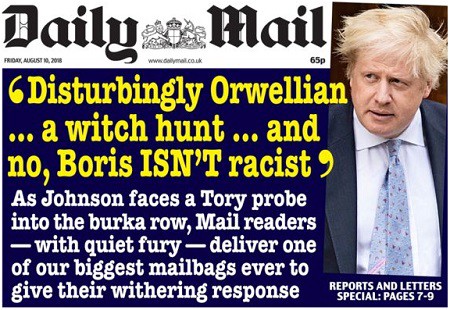 It is uncertain how all this is going to unravel. The Daily Mail has been rallying the Tory rank and file in support of Johnson, depicting him as the innocent victim of a “witch hunt”, while the bookies now have him vying with Sajid Javid as favourite to become the next Tory party leader. Johnson’s immediate political future hinges on the outcome of the investigation his party is currently conducting in order to establish whether disciplinary action should be taken against him.
It is uncertain how all this is going to unravel. The Daily Mail has been rallying the Tory rank and file in support of Johnson, depicting him as the innocent victim of a “witch hunt”, while the bookies now have him vying with Sajid Javid as favourite to become the next Tory party leader. Johnson’s immediate political future hinges on the outcome of the investigation his party is currently conducting in order to establish whether disciplinary action should be taken against him.
Fellow Tories who want to see Johnson dealt with appropriately might be advised to draw the party’s attention to his long record of Islamophobia, as detailed in this article. The “letter boxes” and “bank robber” comments were not some isolated gaffe. When it comes to inflaming public opinion against Muslims, Johnson is a repeat offender.
First published on Medium and Public Reading Rooms in November 2018